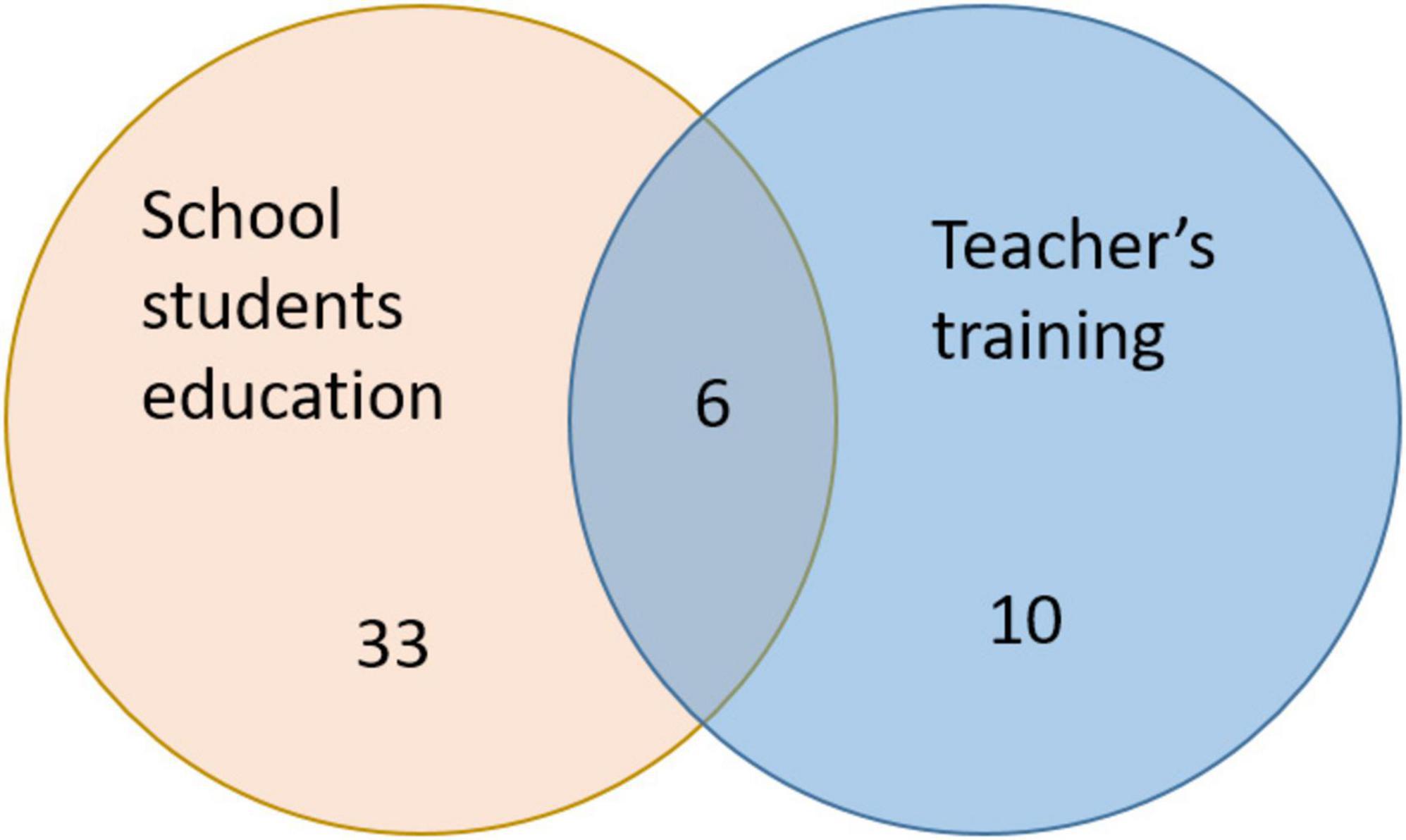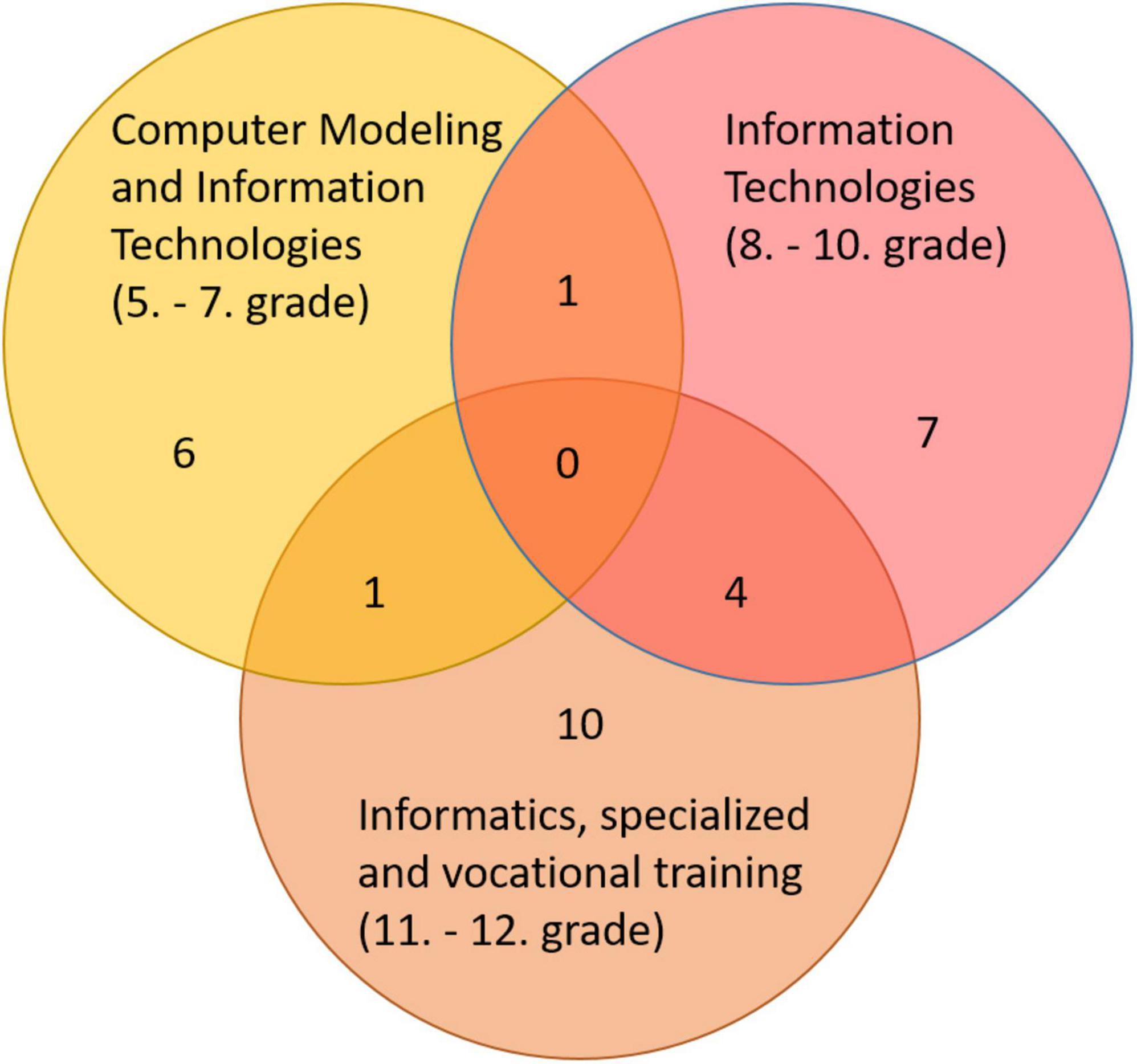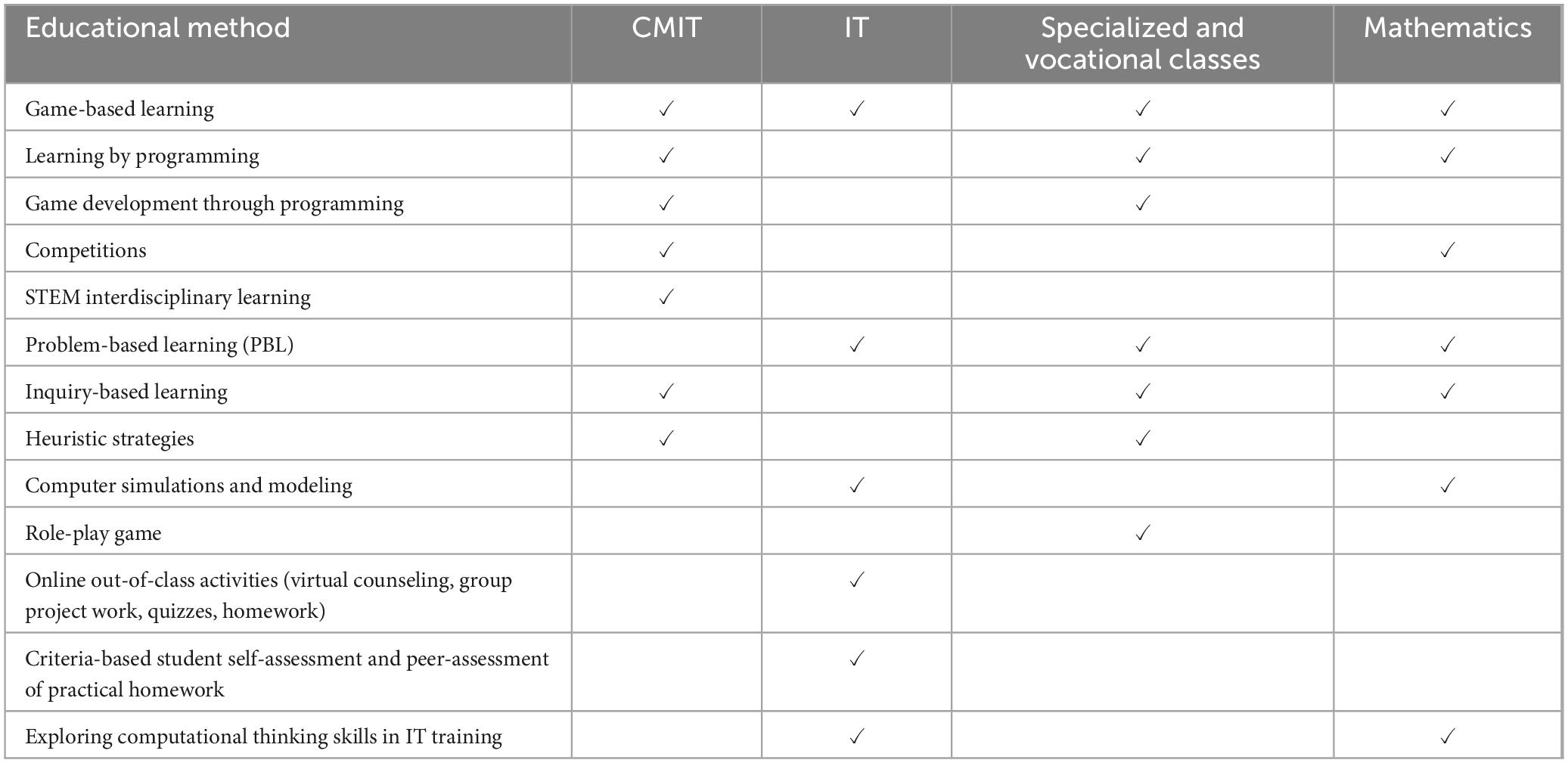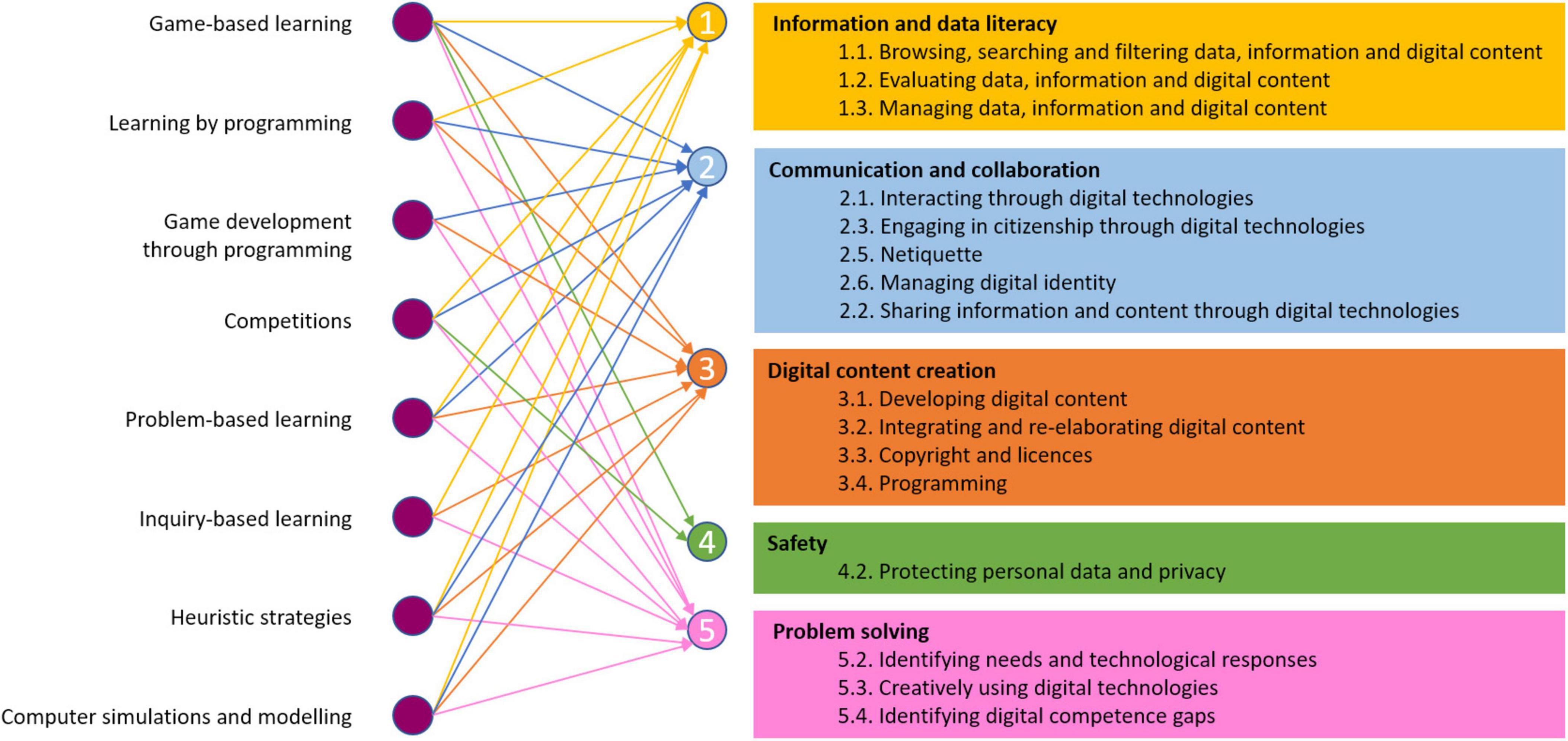- Faculty of Mathematics and Informatics, Sofia University “St. Kliment Ohridski”, Sofia, Bulgaria
The digital competence is one of the key competences needed for an active and fulfilling life. In the Bulgarian secondary schools, there are subjects dedicated to the development of digital competences: Computer modeling and information technologies (CMIT) in low secondary school, informatics and information technologies (IT) in upper secondary school. Partially, the process interweaves mathematics education, too. The focus of the study is to identify good practices for effective development of the digital competences of students in the context of Bulgarian formal education. An additional goal is to identify good practices in the professional development of teachers so that they can successfully develop the digital competences of their students. A systematic literature review is presented to achieve the objectives of the study. The identified teaching methods are classified according to the target groups and the digital competences they contribute to the development of. Finally, methods are outlined that should underpin the training of teachers so that they successfully develop digital competences of their students.
1 Introduction
Nowadays, digital competence is one of the key competences needed for an active and fulfilling life. Concerning the quick growth of information and communication technologies (ICT), the European Commission has developed and periodically updates the Digital Competence Framework for Citizens (DigComp). Its current version, DigComp 2.2 (Vuorikari et al., 2022) announced in 2022, describes knowledge, skills and attitudes that ensure “…the confident, critical and responsible use of, and engagement with, digital technologies for learning, at work, and for participation in society” (Council of European Union, 2018).
The digital competence development at school level–organizational forms, learning approaches, teachers’ readiness, etc., is a topic of interest of policy makers, researchers and practitioners.
1.1 Related research
The ubiquity of digital devices and applications, growing into a digital transformation of all aspects of life, including education, requires educators to develop digital skills. The problem was taken into account by policy makers at the European level and in the 2017 year the European Framework for the Digital Competence of Educators (DigCompEdu) was developed (Redecker, 2017). The general reference frame addresses six aspects of educators’ work that require specific digital competences: (1) Professional engagement; (2) Digital resources; (3) Teaching and learning; (4) Assessment; (5) Empowering learners; (6) Facilitating Learners’ Digital Competence.
According to Tondeur et al. (2021) “The development of digital competencies should be considered an integral part of the functioning of an individual teacher”. In their study, the authors are focused on teachers’ training institutions’ level and the six strategies: Role Models, Reflection, Instructional Design, Collaboration, Authentic Experiences and Feedback. The researchers argue that “these strategies can be employed by teacher trainers to develop preservice teachers’ digital competence to support future technology integration.” They highlight that the preservice teachers’ attitude to the professional use of digital technologies plays an important role for the selection of effective teachers training strategies.
Other scientists, like Rubach and Lazarides (2021) are focused on the teachers’ basic ICT competence. They identify six dimensions of teachers’ basic ICT competence beliefs—information and data literacy, communication and collaboration, digital content creation, safety and security, problem solving, and analyzing and reflecting. Presenting analysis of the relationship between teaching practices (student-centered vs. teachers-centered) and basic ICT competence beliefs, the study enables investigations of different competence dimensions with ICT teaching strategies.
Godhe, 2019 examines how digital competences are conceptualized in curricula for compulsory education within the Nordic countries and discusses different terms used in interdisciplinary education, while Guitert et al. (2021) explore how competence-based education has been developed and implemented in terms of digital competence development, in the education systems in Europe.
The “Digital Education at School in Eorope” report (European Commission/EACEA/Eurydice, 2019) summarizes competence areas and related learning outcomes in European countries. According it, the majority of European education systems have explicitly included learning outcomes related to the five digital competence areas, as follow in descending order: information and data literacy, digital content creation, communication and collaboration, safety, and problem solving. Most of the outcomes are associated with the low secondary school. The document reports that in the most of the countries these learning outcomes are distributed among different subjects, while in others—within a specific separate subject.
Although there many scientific sources discussing policies, curriculum, assessment and outcomes in relation to digital competence development at school level, there is luck of scientific information about the effect of particular teaching and learning methods on the digital competence development in the secondary schools. They could be found mostly in curriculum of some dedicated courses. For example, the program of the Digital Competences for Effective Learning course (Eurolab for Teachers, 2024) implicitly implies about flipped classroom and project-based learning approaches applied for development of teachers professional digital competences.
1.2 National context
Across Europe, digital competence is being taught using several curricular approaches. In secondary education, digital competence is commonly taught as a separate subject, which is often compulsory for all pupils in lower secondary school and increasingly optional in upper secondary education. Around half of the countries also integrate digital competence into other subjects (cross-curricular approach). This approach is, however, more common in primary and lower-secondary education. In Bulgaria, as in Croatia, Bosnia and Herzegovina and Turkey, digital competence is taught only as a separate compulsory subject (European Commission/EACEA/Eurydice, 2023). However, some schools offer additional optional, but still separate, courses.
In Bulgaria, the teaching of informatics began in 1985 when the National Olympiad in Informatics was established (Manev et al., 2007), marking a significant step in formal education related to computer science and programming. Informatics education has evolved since then, with various curricular reforms aimed at integrating digital skills into the school system.
In the frame of the modern formal Bulgarian educational system, there are obligatory disciplines in general secondary school, focused on the digital competence development–“Computer modeling and information technologies” (CMIT) in low secondary school (5.–7. grade, 11–14 years old students), followed by “Informatics” and “Information technologies” (IT) in upper secondary school (8.–10. grade, 14–17 years old students). Specialized classes, developing higher levels of digital competences, are presented in the profiled pre-university general high schools (11.–12. grade, 17–19 years old students) or vocational schools. Application of multi or interdisciplinary teaching approach, especially in combination with mathematics education, also contributes to the digital competences improvement. The close connection with mathematics is a result of shared teachers’ development–the bachelors programmes for pre-service teachers in Bulgaria are bi-directional and they prepare teachers in Mathematics and Informatics and IT. It is not an exception, especially in low secondary school, for the same teacher to teach both subjects–Mathematics and Informatics/IT. In this context, it is natural to complement the content of one subject with elements from the other.
The CMIT, IT and Informatics curricula for secondary schools in Bulgaria are developed on the basis of the DigComp framework. The fact that they are aligned with it does not guarantee high digital competence of students. The latest edition of PISA (OECD, 2023) shows the opposite–low functional literacy. The many reforms of recent years, most of them unfinished, set teachers against innovating in education and transferring of foreign practices.
To help teachers overcome barriers and achieve higher results in developing digital competences of their students, it is important to explore good practices implemented in local context.
1.3 Research question
The main research question of the study is: What are the effective pedagogical methods for the development of digital competences and how are they applicable in the Bulgarian context?
The study should not only to identify teaching methods, appropriate for effective development of digital competences, but also to provide arguments in favor of the fact that the effective development of digital competences of students is feasible.
In order to answer the question, the study sets the following objectives:
• To identify good practices for successful development of digital competences of secondary school students in Bulgaria within the subjects of “Computer modeling and information technologies (CMIT),” “Information technologies (IT),” “Informatics,” and “Mathematics”.
• To identify good practices that develop digital pedagogical competences of teachers in these subjects.
• To formulate recommendations for teachers of these subjects and teacher trainers for effective training to develop students’ digital competences.
2 Methodology
2.1 Materials and methods
This study presents a literature review in which the elements of a systematic literature review were used. In order to provide a structured framework and to enhance the quality of study results, the main stages of preferred reporting items for systematic reviews and meta-analyses (PRISMA) guidelines for systematic literature reviews are followed (Page et al., 2021; PRISMA, 2024). PRISMA is implemented to identify papers, presenting good practices for digital competences development in the frame of education in CMIT, IT, Informatics and Mathematics in Bulgarian secondary schools.
2.2 Eligibility criteria
The articles in the field of education in Bulgarian secondary schools in CMIT, IT, Informatics or Mathematics will be selected. The scope of the selected articles can refer to formal and informal education. The articles should be published in English or Bulgarian in the last 5 years (from January 2019 until December 2023). They should relate to digital competence development practices, good practices (methods, technologies) of students’ training and good practices or guidelines of teachers’ training.
The articles related to primary education and higher education (HE), except higher education for Mathematics and Informatics pre- and in-service teachers training, are excluded.
2.3 Information sources
The Web of Science1 (WoS) and Scopus2 databases for referred and indexed scientific publications are used to select the articles. IATED Digital Library3 with the proceedings of INTED, ICERI and EDULEARN international conferences, dedicated to education and training is included in the sources.
Two well-established specialized Bulgarian scientific journals–“Mathematics and informatics Journal (MIJ)”4 and “Mathematics and mathematical education (MME)”5 are also included. Both are in the field of Mathematics education, but also include Computer Science and ICT education. They both have strictly scientific sections and sections, dedicated to education, and intended mainly for teachers and researchers in the field. “Mathematics and informatics Journal” is the successor, over the years, of several scientific journals in the field of Mathematics, Physics and Informatics in Bulgaria, whose publication started in 1958 and continues to this day. “Mathematics and Mathematical Education” series publishes the proceedings of the Spring Conference of the Union of Mathematicians in Bulgaria, one of the proven national forums in the field of Mathematics, which is held annually, and in 2024 its fifty-third edition is upcoming.
2.4 Search strategy
The search strategy includes keywords search and application of additional filters. The following keywords were selected for the search: “digital competence(s),” “digital literacy,” “digital skills,” “computational thinking,” “programming,” “Bulgaria,” “secondary school,” and “education.” The search used phrases combining these keywords, for example: “digital competences + Bulgarian school,” “digital competences in ICT education + Bulgarian education,” “digital AND competence AND Bulgaria AND education,” “digital AND competences AND Bulgaria AND (mathematics OR math).” The articles found were further filtered by the period (2019–2023), subject (Mathematics, Informatics, IT, Computer modeling), pre-service and in-service teacher training.
2.5 Selection process
Selection process proceeded in two stages. The first stage includes the initial search which identified a total of 225 manuscripts (91 from WoS, 21 from Scopus, 26 from IATED, 37 from MIJ, and 50 from MME), 9 of which were duplicated. After abstract screening, 167 articles were classified as non-eligible and excluded by some of the following criteria: (1) article in different context than defined in the research question; (2) article with general content about, or without context to, the digital competence development; (3) article about general teacher training; (4) methods for teaching and digital competence development in primary school and/or HE; (5) special educational needs (SEN) students teaching. The articles corresponding to the research questions that describe good practices in vocational education and training were included. Finally, after the first stage of the selection process, a total of 49 articles remained, 6 (12.24%) obtained from WoS, 12 (24.49%) from Scopus, 10 (20.41%) from IATED, 14 (28.57%) from MIJ, and 7 (14.29%) from MME. The total number of articles, selected for analysis at the end of first stage, is 49. Data for all 49 articles included in the analysis can be found in Supplementary Table 1. In the second stage of the selection process the detailed reading of the full text of the manuscripts was done. The selection criteria were applied to the full text of the remaining 49 articles. 11 manuscripts were excluded for the following reasons: (1) for primary or higher education, 7 articles; (2) no specific teaching method, 3 articles; (3) for public sector/industry, 1 article. Figure 1 describes the selection process.
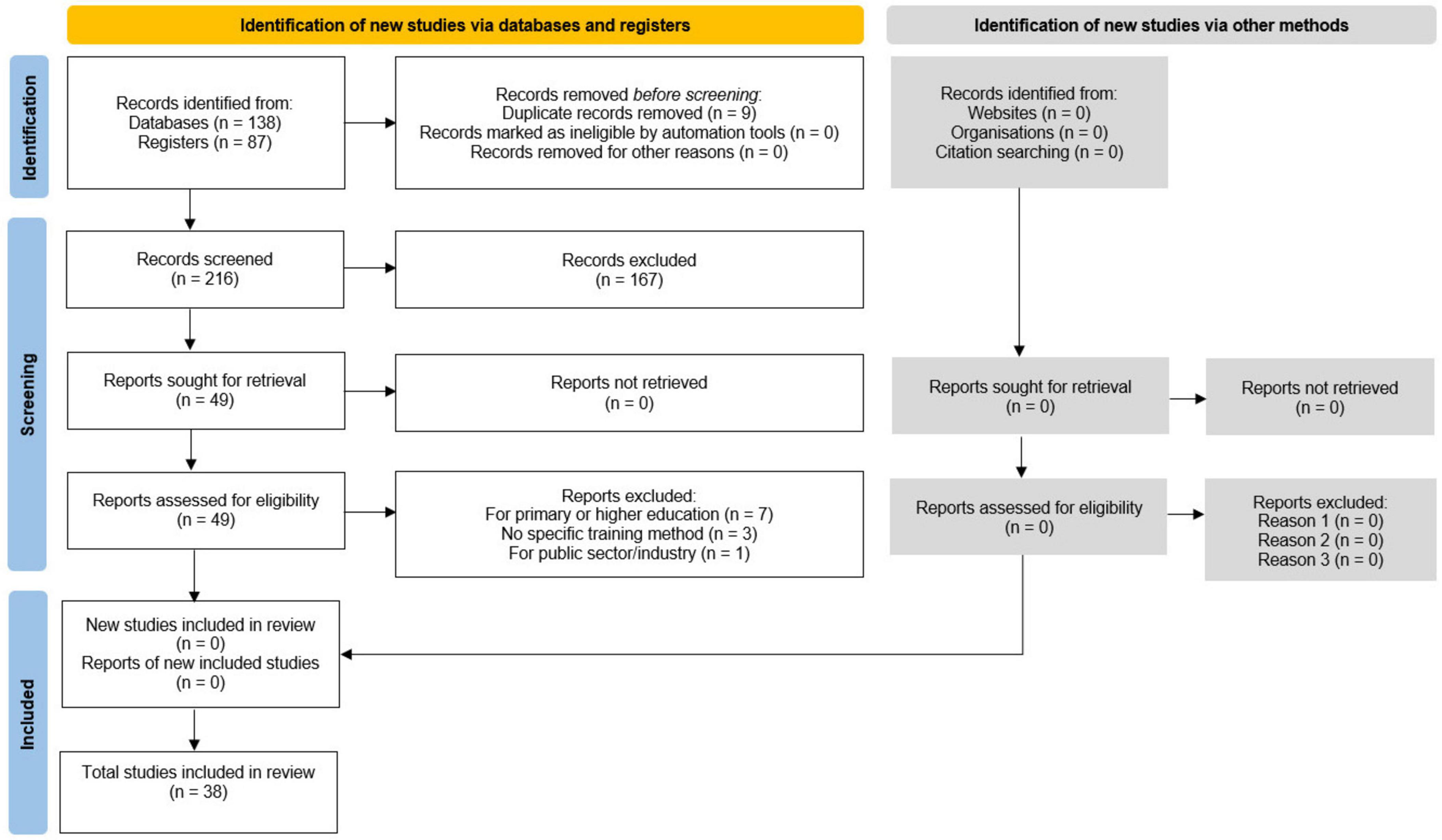
Figure 1. Systematic literature review flowchart–selection process. Source: Created by the author based on app (Haddaway et al., 2022).
2.6 Study risk of bias assessment
One article was reviewed at the extended abstract level, due to the unavailability of the full text. The presented arguments are at the level of extended abstract and rely on the reliability of the database from which it is extracted. This article is marked with an asterisk (*) in the analysis.
The full list of 38 articles included in the final literature review is presented in Table 1.
3 Clusterification, based on the context
Starting from the main question: What are good practices for developing students’ digital competences, which could be offered as subjects of teachers’ training?, the articles were clustered in two main groups. The first group refers to good practices in the classroom for students. The second group focuses on teacher training in the same disciplines for the development of pedagogical digital competences according to the DigCompEdu framework (Redecker, 2017). Six of the articles referred to both groups (Figure 2).
Looking for good practices in student’s digital competence development, the main focus was on the education in Computer modeling and information technologies, Information technologies, and Informatics–subjects that are dedicated to the development of the student’s digital competences at different stages and different levels. As shown in Figure 3, there were articles that refer to more than one cluster.
The described good practices of digital competence development in the frame of education in Mathematics show two main approaches–explicit digital competence development through multidisciplinary/interdisciplinary learning, and implicit development through the use of ICT in Mathematics education (Figure 4).

Figure 4. Implicit and explicit digital competence development in the frame of mathematics education.
3.1 Computer modeling and information technologies, low secondary school education
Computer modeling and information technologies is a mandatory subject in low secondary school, whose main focus is the development of students’ digital competences at Foundation levels (1, 2) according to the DigComp 2.2. framework.
8 articles relate to the digital competence development in the frame of the CMIT. All of them are full-text screened. One article turned out to be irrelevant as it relates to primary school education.
3.2 Information technologies, upper secondary school education
In the upper secondary school, the CMIT subject continues as information technology (IT) obligatory for all students discipline and Informatics–only for specialized schools.
A full-text screening was performed on 12 articles. The review shows that 6 of them do not relate to the research question–they discuss e-learning platforms, IDEs or not eligible target groups (public administration, industry and small and medium-sized enterprises). After their exclusion, a total of 6 articles in full text are screened.
3.3 Specialized and vocational training in Informatics, upper secondary school and vocational schools
The specialized classes in Informatics offer second level Informatics education (preparation for the university) at upper secondary schools or professional training in computer programming, at vocational schools. 15 of the articles in the collection relate to digital competence 3.4. Programming, which is in focus in the specialized classes. One of them is analyzed on the basis of an extended abstract. It is marked with asterisk (*). A full-text screening has been performed on the others (14).
3.4 Mathematics, secondary school mandatory and extra classes education
The main role of Mathematics education is not to form digital competences. On the other hand, the academic programs for development of pre-service and in-service teachers in Bulgaria are bi-disciplinary, and the field is “Teaching Mathematics and Informatics.” This means that (1) the Mathematics teachers have a high level of digital culture and (2) Informatics and IT teachers have a strong mathematical base. This allows integrating the effective use of ICTs in Mathematics classes, a good collaboration of both–group of teachers, and organization of multidisciplinary education. In practice, many teachers, especially in low secondary school, share teaching of both subjects–Mathematics and Computer Modeling and IT. In addition, the Mathematics lessons could bring the power of critical thinking and analytical thinking development to the forming of digital competence.
A total of 10 articles about development of digital competences in the context of teaching Mathematics in Bulgarian schools were identified. After full text screening, one of them was rejected as not relevant (discussing higher education). The other 9 are fully analyzed, looking for practices for implicit and explicit digital competence development during teaching and learning Mathematics.
3.5 Mathematics and informatics/IT teachers’ training and guidance
The second big cluster is dedicated to the identification of good practices for teachers’ (in Mathematics, Informatics, and IT) pedagogical competences development and, specifically, their ability to apply effective approaches for students’ digital competence development. 18 papers on the topic were identified after the selection process. Three of them were excluded as not relevant–one of them presents a document review, two others refer to not relevant target groups (SMEs employees and higher education professors). Finally, 13 papers are included in the analysis.
4 Results: classification of good practices for digital competence development
4.1 Good practices for students’ digital competence development
4.1.1 Computer modeling and information technologies, low secondary school
The most effective teaching and learning methods for digital competences development at the given ages (12–14 years old students) are representatives of the group of active learning methods–Game-based learning (GBL), Inquiry-based learning (IBL), Learning by programming, Learning by doing, etc.
Game-based learning (GBL), learning by programming and game development through programming: The methods are applied to develop digital competences in the Programming sub area. In parallel, the study reveals digital competences for interacting through digital technologies and creatively using digital technologies. Georgieva and Tuparova (2019), and Harizanov (2023), provide an overview of a set of integrated development environments (IDEs) appropriate for students’ programming competence development at given ages. Georgieva and Tuparova conclude that “computer educational games have the potential to create a motivating and fun learning environment as they contain activities that meet educational standards, learning objectives, allow for feedback and can achieve high learning outcomes.” Georgieva (2023) goes far, providing game-based tasks for solving by turtle graphics.
STEM interdisciplinary learning, inquiry-based learning and heuristic strategies in learning: These methods are reported in two sources. Both of them share a wide range of developed digital competences, covering Information and data literacy, Communication and collaboration, Digital content development, and Problem solving areas, while the methods are applied in teaching STEM disciplines. Kenderov and Chehlarova (2020) discuss the methods in the frame of a national competition “VIVA mathematics with a computer.” They provide half-baked solutions, provoking students to revise, rearrange, and elaborate them, while exploring hidden possibilities to extract new information or insights about mathematical dependencies. Antonova et al. (2019) share design and experience on an inquiry-based learning scenario, delivered with students and with teachers as a meta-course. Both authors’ teams explore the approaches to develop curriculum goals in the STEM disciplines, revealing their potential to develop also learning-to-learn skills and digital competences, as well as to increase the students’ motivation.
Table 2 presents the results in more details.
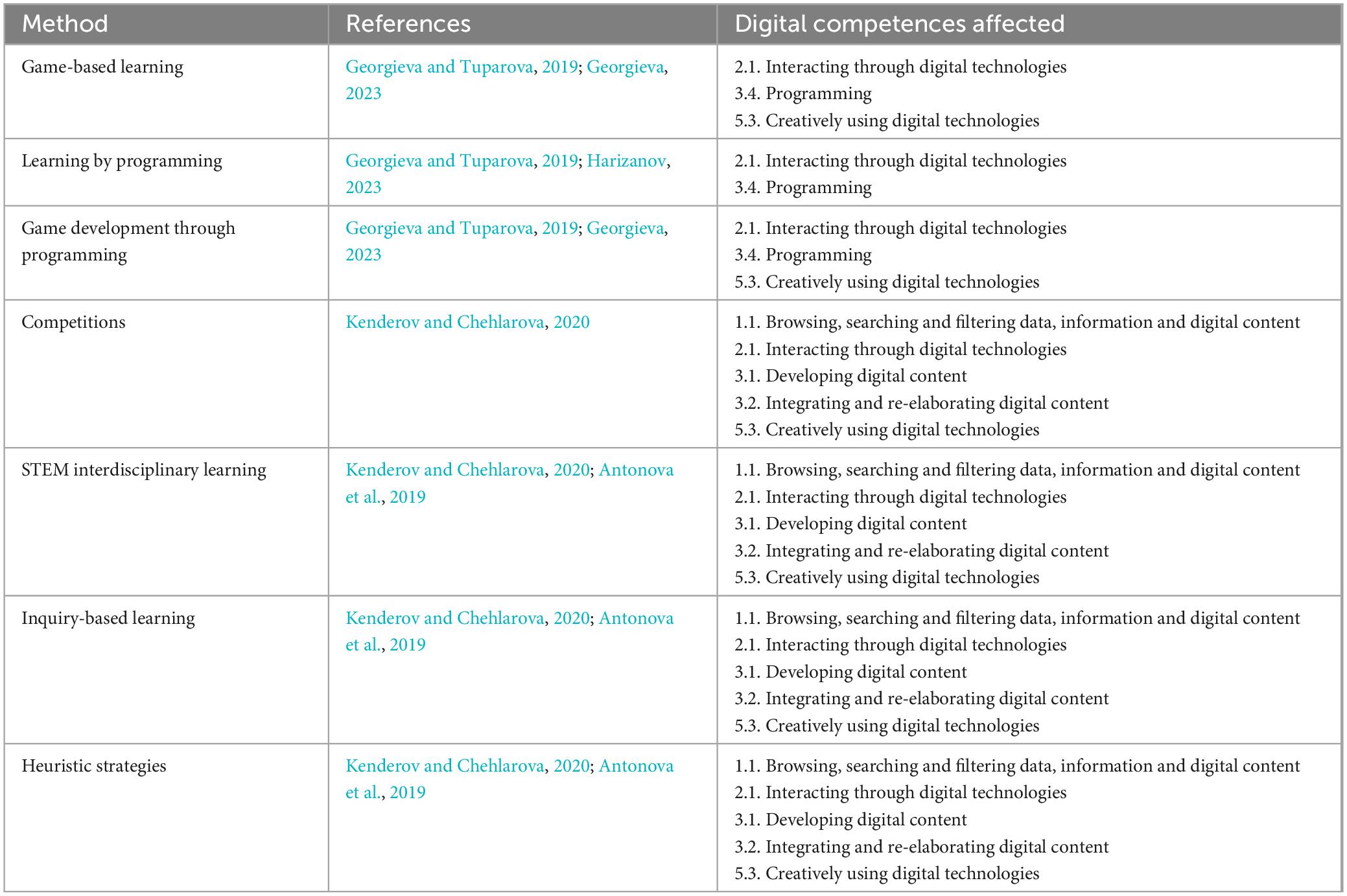
Table 2. Methods reported for successful development of digital competences in Computer modeling and IT, low secondary school education.
4.1.2 Information technologies, upper secondary school
À total of 6 articles in full text are screened.
After the analysis, 6 groups of effective methods of teaching and learning at the targeted grades are identified.
Use of computer simulations and modeling: Chehlarova (2022) describes developed game-based billiard game simulation models through the GeoGebra software6 that can be used in several subjects like Mathematics, Information Technologies, and Physics to develop higher order thinking skills through experiments and problem solving on a computer simulated billiard plot by applying several pre-developed computer models of billiard game situations. The students can modify and adjust models and perform simulations in order to achieve higher billiard game results. Also, Chehlarova (2021) describes computer simulations and modeling experiments for using IT in Mathematics and Arts modeling for a restoration of an early Christianity mosaic (5–6th Century) in possible Mathematics, Art, and IT competition for talented students. These opportunities develop their specific digital competences in the areas of 1. Information and data literacy, 3. Digital content creation, and 5. Problem solving.
Game-based learning (GBL): Alongside with the game-based billiard simulations, described by Chehlarova (2022), Ivanov (2019) describes the game-based learning in the school subject of IT implemented by use of the well-known Minecraft game (Education Edition). The game and the preliminary carefully developed learning scenarios by the teacher allow students to not only create a fun story line in virtual classes, and to acquire important digital competences, but also confront them with real-life problems that they need to solve in competing environments and situations. In this way the students become aware of the importance of the studied digital competences throughout the IT subject for their use in real life situations.
Problem-based learning (PBL): Problem-based learning (PBL) is usually exploited in combination with other active learning methods, like Game-based learning, Computer simulations and modeling, Inquiry-based learning and similar. Kenderov and Chehlarova (2020) describe their experience with respect to an advanced online competition named “VIVA Mathematics with computer.” The competition includes “half-prepared” in advance GeoGebra files with Geometry problems that the participants in the competition should study carefully, manipulate, add commands and change in order to solve the posed problem. The authors especially point to the fact that besides the mathematical competences, the competition helps students to develop an array of their digital competences in the following DigComp areas 1. Information and data literacy, 3. Digital content creation, and 5. Problem solving.
Online out-of-class activities: Virtual counseling hours, delivered by teacher; Online group project work; Online theoretical quizzes; Online homework practical IT assignments; Criteria-based student self-assessment and peer-assessment of practical homework assignments.
In their article Slavova and Garov (2019) describe an array of methodologies, both “classical” and innovative, experimented by them in the process of preparation of 10th grade students for the non-compulsory National External Evaluation (NEE) of Digital Competences (DC), given after grade 10 for all Bulgarian schools—general secondary schools, and profiled or professional gymnasia. During the process of preparation for the NEE of DC, they diversified the more “traditional” methods of “classical” lecturing, drill and practice, and testing methods, used in the “Information Technologies” subject, by online, cloud-based, amplified versions of the “classic” teaching-learning methods, and some new, cloud-ameliorated and enriched online learning methodologies, such as: Out of class virtual counseling hours, delivered by teacher; Online (cloud-based) out-of-class group project work; Cloud-based out-of-class theoretical quizzes; Online (cloud-based) homework practical IT assignments; Criteria-based student self-assessment and peer-assessment of practical homework assignments, finally checked by the teacher (Slavova and Garov, 2019, pp. 46-47.) The results on the NEE of digital competences, achieved by the students show a significant improvement of the obtained results for the experimenting school in comparison to the previous school year.
Exploring computational thinking skills in IT training: Gaftandzhieva et al. (2021) propose the use of an advanced teaching methodology of developing and using Computational thinking skills in IT training for school and university students. The methodology is based on the development and use in learning of invariant frameworks for IT knowledge features. It proposes to teach most importantly the students about the stable invariant characteristics through time of the different types of ICT tools in use. In this way the students will acquire the conceptual knowledge and skills about the work, use, and products of a given type of ICT tools so as to cope with the inevitable fast pace of the changes of that type of ICT tools through time.
Table 3 presents the summary of the analysis.
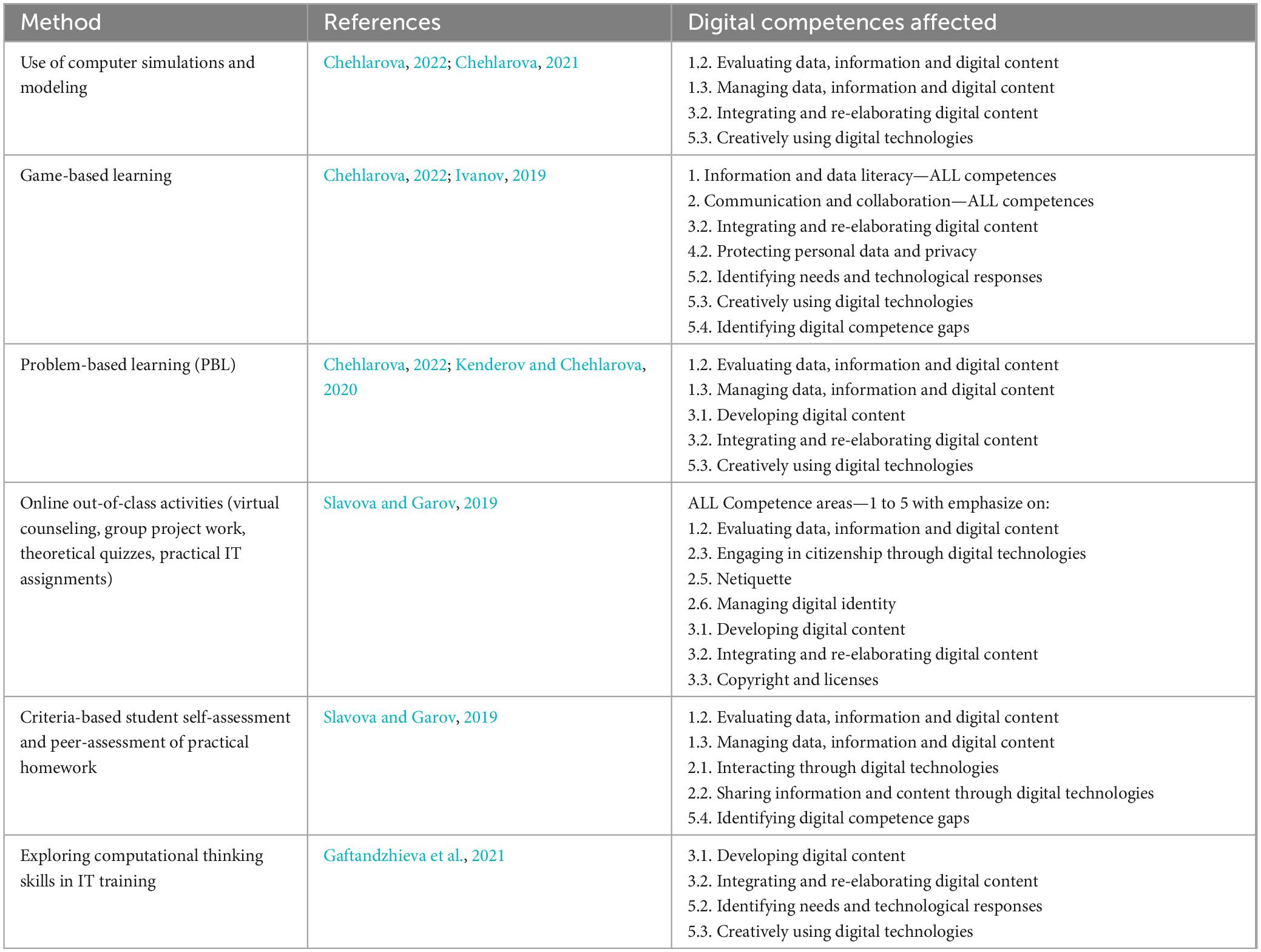
Table 3. Methods reported for successful development of digital competences in Information Technologies, grades 8.–10.
4.1.3 Informatics in specialized education and training in informatics, upper secondary and vocational schools
Specialized education in informatics is delivered in upper secondary school, level 2 and in vocational schools. Its main subject is to develop digital competences in the 3.4. Programming sub-area of the digital competence framework. A full text screening was performed on 14 articles. The review shows that 8 of them do not relate to the research question–they discuss e-learning platforms, IDEs, policies, or not eligible target groups. After their exclusion, a total of 6 articles–5 in full text and 1 extended abstract (*) are screened.
After the analysis, 7 groups of effective methods of teaching and learning at the given ages are recognized.
Gamification and Game-based learning: The methods are reported as appropriate for development of digital competences in the areas Information and data literacy, Digital content creation (especially Programming), and Creatively using digital technologies. Georgieva and Tuparova (2019) formulate 10 criteria for selecting educational games or IDEs, ensuring an environment for effective application of the approach. Iliev (2019) shares his first evaluation results of a similar environment, developed by himself.
Learning by programming: The method is reported as a powerful approach for multidisciplinary teaching in informatics and other specialized subjects for the target group. Zablotskii and Vasileva (2020) share experience with problem solving, where the problem is extracted from the geodesy area (vocational school). Students explore their knowledge on geodesy to program software, which could be used in needed calculations there. Marinov and Laskov (2019) discuss the same approach in math education (upper secondary school, specialized classes in mathematics and informatics). They also comment on programming as an approach for gaining mathematical insights. All the authors discuss a wide range of digital competences, developed in parallel–all the competences in the area of Information and data literacy, competences for interacting through digital technologies (programming code and IDEs), programming, creatively using digital technologies.
Game development through programming: The method shares the advantages of Game-based learning and learning by programming. Georgieva and Tuparova (2019) underline that, in the traditional style students learn in an unrealistic controlled environment, while developing games offer them new, non-controlled by the teacher challenges and grow up their motivation.
Problem-based learning: Table 3 reveals that the approach is applied in combination with Learning by programming or Game development through programming approaches. Setting up challenges and motivation for modeling and looking for new knowledge and dependencies, the method provides conditions for high level of motivation and achievement not only for lesson goals but also for development of digital competences in almost all of the areas. In addition to multidisciplinary learning, this is also achieved within a single subject. For example, Mollov and Petrov (2022) presents the method application in the context of functional programming lessons.
Inquiry-based learning: Surprisingly, the use of this method hardly occurs in the reviewed articles. It is commented only by Iliev (2019) in the context of requirements for the gamification educational software, developed by him.
Heuristic strategies: Mollov and Petrov (2022) also pay serious attention to the comparative analysis and analogies as heuristic strategies for smooth transition from procedural to functional programming for effective development of digital competences in the Programming sub-area.
Role-play game: Dyulgerova and Atanasova (2021)* present an application of role-play game during the process of design and implementation of a database, serving “the management of companies from various fields: real estate, recruitment, transportation services and more.” According to them, the method supports effective development of competences for managing data, information and digital content.
Table 4 summarizes the reported pedagogical methods implemented in specialized education and training in the field of informatics and ICT.
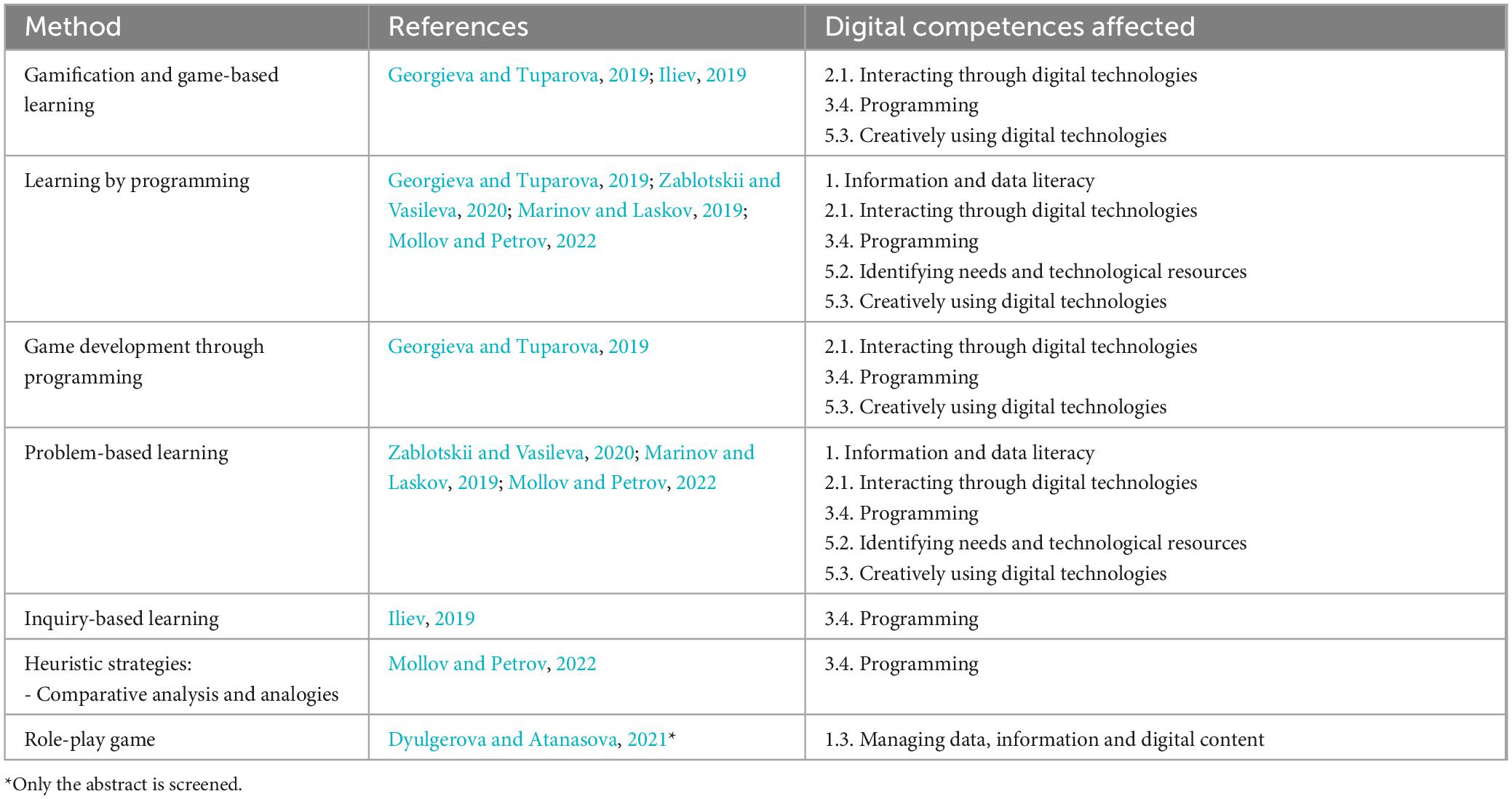
Table 4. Methods reported for successful development of digital competences in specialized education and training in informatics, upper secondary and vocational schools education.
4.1.4 Mathematics education
Integration of GeoGebra in mathematics education: Integrating GeoGebra into mathematics education enhances students’ ability to independently explore and apply in-depth mathematical concepts, promoting information and data literacy. By accessing dynamic visualizations and extracting relevant data for analysis, students are able to create digital content (Kenderov et al., 2021).
Problem-based learning: The PBL method, presented by Chehlarova (2022) involves the comprehensive process of collecting and analyzing information employing technologies. Although not explicitly mentioned, working with specialized software requires an understanding of digital safety and the responsible usage of digital tools. Antonova et al. (2019) study explored a visit to a paleontology museum where both teachers and students engage as researchers involving the collection of information from the exhibition. Subsequently, the collected data, prompting the use of digital tools and software for data analysis and interpretation.
Game-based learning: Students engaging with computer models need to interpret and analyze data generated by simulations. Additionally, students should be educated on the responsible and safe usage of online resources, particularly when accessing the Virtual Mathematics Laboratory (Chehlarova, 2022), emphasizing digital safety.
Competition: Contestants are expected to possess preliminary skills in handling specialized mathematical software, comprehending the functionality and limitations of the tools employed during the competition and readiness to troubleshoot potential technical issues. In the paper by Kenderov and Chehlarova (2020), specific examples illustrate how GeoGebra files contribute to the simultaneous development of both digital and mathematical competence in students.
Inquiry-based learning: The entire learning model is centered on the integration of technology in education, emphasizing the use of digital tools for various inquiry-based learning activities (Antonova et al., 2019). The sharing phase emphasizes communication competences as well, involving the ability to present findings effectively and engage in collaborative discussions.
Learning by programming in mathematics education: Learning algorithmic programming in C++ in the math education area represents a direct integration of technology into the educational process, showcasing the application of technology for solving mathematical problems (Zablotskii and Vasileva, 2020).
Detailed results of analysis are presented in Table 5.
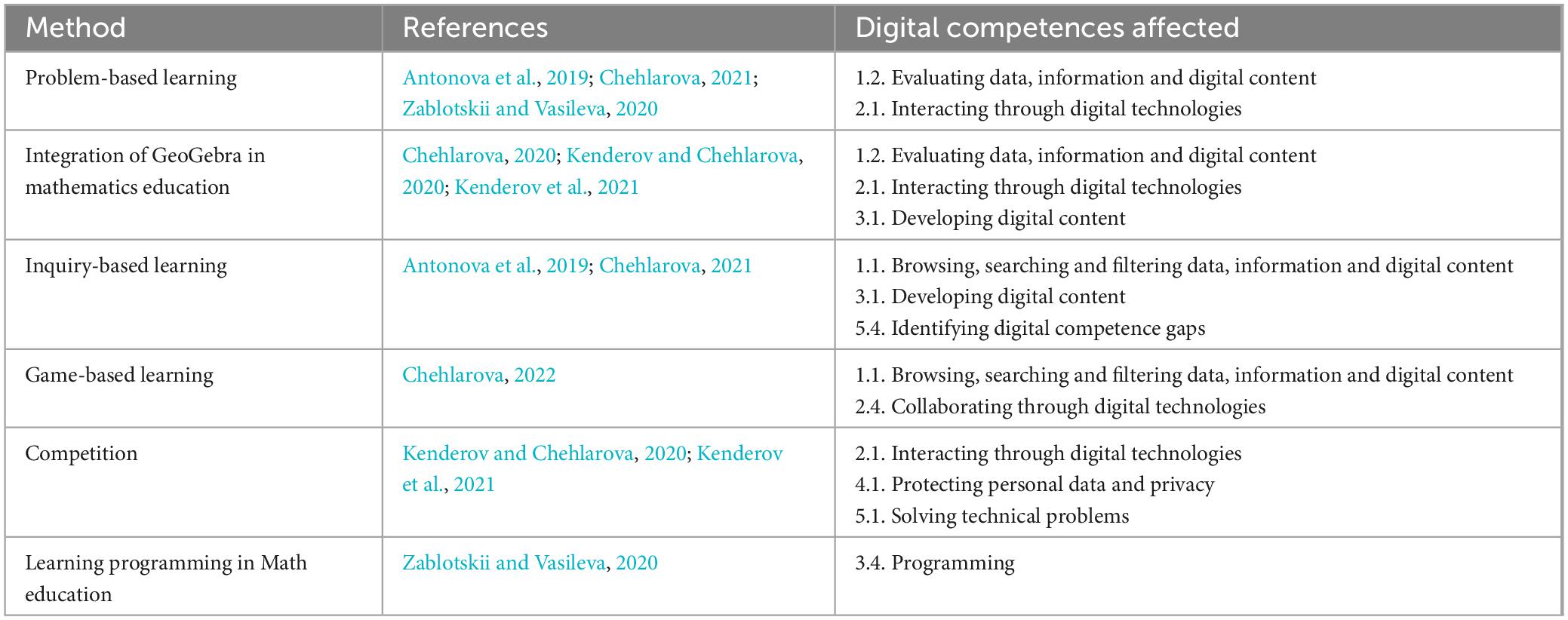
Table 5. Methods reported for effective development of digital competences in Mathematics, secondary school education.
4.1.5 Digital competences development of educators in mathematics, informatics and IT through teachers trainings and guidance
A full-text screening was performed on 29 articles. The review shows that 4 of them have only abstracts and no effective methods of teaching, concerning the digital competences of educators, can be identified in these abstracts. Another 15 of them do not relate to the research question–they discuss platforms and tools, broader societal or business digital competences’ needs, broader digital competences of all groups of teachers in general, but without referring to concrete methods for DigCompEdu competences’ development, or not relevant target groups. After their exclusion, a total of 10 articles in full text were screened.
After the analysis, 8 groups of effective methods of teaching are identified for the development of teacher digital competences (DigCompEdu).
Problem-based learning (PBL): The article of Chehlarova (2022) discusses the use of game-based billiard game simulation models as a didactic tool, that could be used by teachers to develop students’ digital competences and higher order thinking skills in the frame of several subjects like Mathematics, Information Technologies, and Physics. In another article, she describes a practical teacher training method with computer simulations and modeling experiments in Mathematics and Arts by digitally restoration an early Christianity mosaic (Chehlarova, 2021). These methods in the teacher training develop educators’ specific digital competences in areas 2 to 6 of DigCompEdu.
Use of augmented reality: In their article Goranova and Voinohovska (2021) share their experience on the creation and use of augmented reality in teacher training for the development of the digital competences of teachers, and as a valuable method of teaching that teachers can use in both face-to-face and e-learning mode of teaching. They especially point out augmented reality as a valuable instrument and method for development of the teachers’ DigCompEdu competences in areas 2. Digital Resources, and 3. Teaching and Learning. Augmented reality in teaching and learning can also be very effective in area 5. Empowering Learners—more specifically for acquisition of competences 5.1 Accessibility and inclusion, and 5.3 Actively engaging learners.
Game-based learning and gamification: Besides the game-based learning in a simulation game, discussed by Chehlarova (2022), in a meta-analysis paper Pavlova (2023) makes an overview of the development in the professional interests of graduate students (Bachelor & MSc. degree) of Shumen University, who are completing their education as teachers in Mathematics, Informatics, and Information Technologies. The analysis focuses on the topics of the diploma theses and outlines the identified groups of competences of the graduated teachers, developed through their work on the theses. With respect to the obtained digital competences of the graduates, the author points out that 17 out of the 61 diploma theses during the period 2014–2022 deal with the problems and develop teaching methods of gamification and game-based learning.
Training on delivery of e-learning: Pavlova (2023) in her analysis of the topics of the diploma theses of the graduate students notices that “almost all” (p. 228) of the diploma works treat also teaching methods, related to e-learning—far before the COVID-19 pandemic time. In a particular experimental study of training teachers to teach with Google Classroom in a selected school Mollov (2019) points out that the teachers eagerly studied how to teach in the e-learning environment and developed their digital pedagogical competences in the areas 2 to 6 of DigCompEdu.
Exploration of computational thinking skills in IT training: As described above, in the section for digital competences for students in Information technologies, Gaftandzhieva et al. (2021) propose the use of an advanced teaching methodology of developing and using computational thinking skills in IT training for school and university students. The methodology is based on the development and use in learning of invariant frameworks for IT knowledge features. Teachers are trained to teach the students about the stable invariant characteristics of the different types of ICT tools in use. In this way, the students will develop conceptual knowledge and skills about the purpose, critical characteristics and invariants of work with particular types of ICT technologies currently and in the future.
Developing digital competences: The purposeful development of digital competences of the 21st Century (including pedagogical competences) is presented in the articles of Mihnev et al. (2021) and Antonova et al. (2022). The paper is based on the experience, gained in the frame of a European Erasmus project “CATCH21” by purposefully developed training manual and by using the opportunities of a particular e-learning platform (Moodle) to incorporate competences and to associate them with learning resources and activities. The training manual and the developed course for educators and students practically covers all competence areas of DigCompEdu, especially in its dedicated chapter “Using Technology as a Tool for Learning,” and also in other chapters of the manual, like “Communication and Collaboration,” “Creativity and Innovation,” and “Critical Thinking.” After the project, the course is included in the curricula of the Faculty of Mathematics and Informatics of Sofia University “St. Kliment Ohridski” and is offered to students of the teaching BSc. program “Mathematics and Informatics” and to the students of other bachelor and MSc. programs of the faculty.
Inclusive education practices: How to design courses for inclusive education in training future teachers in Mathematics, Informatics, and IT, and how to integrate inclusive education practices, are the main topics of the two articles of Zafirova-Malcheva et al. (2019a,b). The course is part of the national curriculum for professional teacher and educators training in Bulgaria and contributes to the formation of the digital competences of educators by presenting different inclusive practices that can be used in education.
A brief description of the good practices for teachers training and guidance is presented in Table 6.

Table 6. Methods reported for successful development of digital competence of educators in mathematics, informatics, and information technologies.
After a brief review of the Table 5 above about which competence areas and competences of DigCompEdu are discussed and taught explicitly according to the reviewed 10 articles, it can be noticed that the competence area 1. Professional engagement and its competences are addressed explicitly (i.e., training is described about) only in 2 mutually related articles out of all 10 articles under review.
5 Conclusion and discussion
5.1 Conclusion
The summarization of the result (Table 7) shows that the most powerful teaching and learning methods for students’ digital competences development are the student-centered active learning methods.
The union of pedagogical approaches that are reported as efficient in all the studied subjects and target groups contains mostly active-learning methods having potential to provoke students’ critical thinking and creativity. The intersection of the sets reveal that the Game-based learning, followed by Learning by programming, Problem-based learning and Inquiry-based learning are appropriate for all target groups and subjects, discussed in the study.
It reveals also that the Game-based learning, Problem-based learning, Inquiry-based learning, Heuristic strategies, competitions, and use of computer simulations and modeling, through their complex nature contribute to almost all digital competences development (Figure 5). Learning by programming has a special place in the development of programming competences.
For the students in upper secondary school, the application of self-regulated or teacher-supported online activities (virtual counseling, group project work, quizzes, homework) provides added value to their digital competence development.
The observation means that these methods of teaching should be a subject of teachers’ trainings in terms to be largely implemented in school practice.
From the Figure 5 it could be noticed that the literature does not discuss good practices for effective development of competences in area 4. Safety. One possible reason is that the area is not sufficiently covered in school curricula. While the sub-area 4.2. Protecting personal data and privacy is addressed at all school levels in Bulgaria, the sub-area 4.1. Protecting devices is a topic of learning only in the low secondary school, and the other two sub-areas—4.3. Protecting health and wellbeing and 4.4. Protecting the environment, are missing in the school curriculum. In contrast, Protecting health and wellbeing sub-area has “explicit learning outcomes in more than half of European education systems,” covering topics like prevention of risks, linked to overuse of digital technologies, addiction, and physical health. As the teachers believes about their ICT skills reflect on their teaching practices (Rubach and Lazarides, 2021), weak teachers’ digital competences in these subareas also could be a reason for avoiding the topics in their teaching practices.
On other hand, to be able to develop students’ digital competences, the teachers should not only be familiar with modern educational approaches, but also to develop their own general and pedagogical digital competences. In the field of teachers’ development, the Bulgarian scientific literature reports the implementation of meta-courses based on the same good practices–Game-based learning and gamification, Problem-based learning, simulations, modeling and use of augmented reality in their professional development. Special training on the e-learning and inclusive education practices could improve their pedagogical digital competences.
The results correspond with a study of Røkenes and Krumsvik (2014), who explore the topic of the approaches for effective pre-service teachers’ digital competence development. In their literature review, they elaborate 42 studies on the topic, conducted in Australia, Canada, France, Germany, Norway, Spain, Taiwan, Turkey, the UK, and the United States. The authors identify eight categories of approaches for successful general and pedagogical digital competence development of future teachers–collaboration, metacognition, blending, authentic learning, modeling, student-active learning, assessment, and bridging theory and practice gap. However, they discuss that “The different approaches are illustrated through synthesis and quotes from single studies.” The same condition is observed in the present study also.
5.2 Limitations of the evidence
The paper analyzes best practices reported in Bulgarian training contexts. It is assumed that good practices already widely implemented in the Bulgarian learning context have not been reported.
Similarly, the issue of training of teachers in CMIT, informatics, IT and mathematics is addressed. There is almost no discussion of Area 1. of DigCompEdu–Professional engagement.
A probable reason is the fact that all future teachers in Bulgaria compulsorily study an ICT in Education and Work in Digital Environment subject devoted to the development of their competences in this area and for this reason, it is not of interest to researchers.
5.3 Implications of the results for practice, policy, and future research
The topic of the development of digital competences of school students and the general and pedagogical digital competences of future teachers has provoked the interest of researchers for a long time, but this has been particularly strongly expressed in the last five years–during and after the COVID-19 crisis, when educational institutions were forced to suddenly jump into e-learning and distance learning mode.
A search in Web of Science Core Collection repository on the topic “digital competences development” and described good practices anywhere in the text [query: TS = (digital competences development) AND ALL = (good practices)] returns 87 results from different categories (Figure 6).
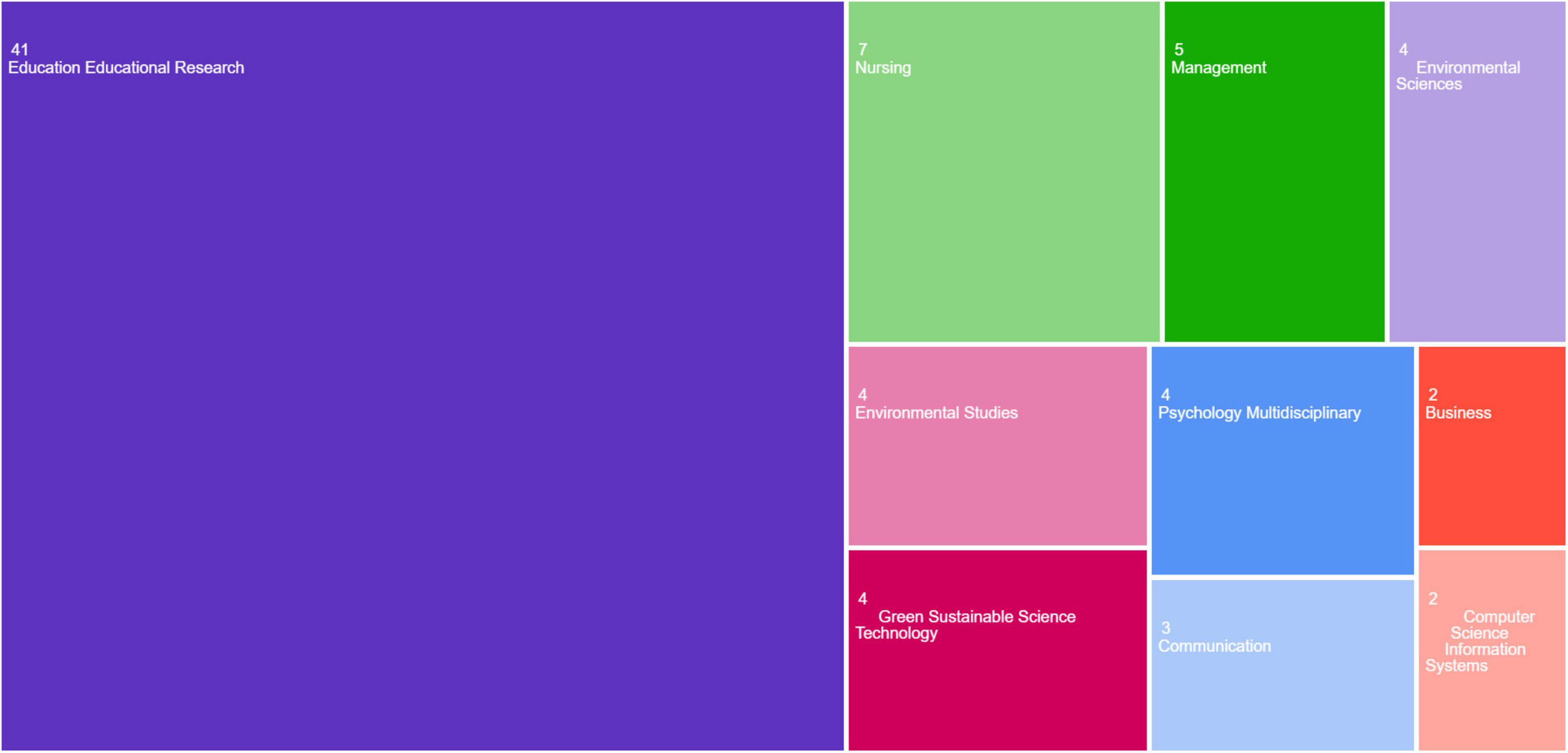
Figure 6. Researchers interest on the good practices in digital competence development (source: https://www.webofscience.com/).
Screening of the abstracts, following by filtering the articles dedicated to the secondary school good practices show that the researchers are focuses mostly on the application of different ICT tools in teaching and learning practice but not from the aspect of purposeful students’ digital competence development. There was not an article addressing the good pedagogical practices for raising the level of digital competence of students or developing specific areas and sub-areas of digital competence. The problem is mentioned also by Rubach and Lazarides (2021), who notice that “there is a scarcity of research regarding the associations between teachers’ basic ICT competence beliefs and the implementation of ICT teaching practices.”
From other hand, the publicly available syllabuses of training courses on good pedagogical practices for digital competence development provide insights about these practices and a filed for further deep research on local case studies, where it is possible to find implicit evidence about the most appropriate approaches.
The filter on teachers’ training reveals that researchers value the need for teachers’ digital competence development and, in addition, teachers’ pedagogical digital competence development. However, Hämäläinen et al. (2021) team discuss that “The lack of large-scale research based on cognitive assessments of the digital competences of teaching professionals is surprising, given that teaching professionals are a critical factor in students’ learning.”. They express the surprise that “the correlations of participation in ICT-related professional development with the respondent’s background in ICT and self-assessed digital competence (measured via inclusion of ICT in teacher education and training, and self-assessed preparedness for using ICT for teaching and need for professional development in ICT) were practically zero.” McGarr et al. (2021) notice that the resent national policies directed toward teachers’ digital competence in Norway, Ireland and Spain are influenced by either the UNESCO, DigCompEdu or the International Society for Technology in Education (ISTE) frameworks. They mention that “Reference to such frameworks may therefore create the illusion of international alignment that masks considerable differences” and address the need of research on the convergence of policies with practice.
The results of the presented literature review could be used by:
• Teachers in CMIT, informatics, IT and mathematics in Bulgarian context, and in similar disciplines in international one: to improve their teaching practices addressing students’ digital competence development
• Students’ textbook authors: to integrate good practices in students’ activities
• Institutions, offering teachers’ professional development programs: to design and develop training programs on implementation of the good practices for students digital competence development
• Teachers’ educators: to design and conduct teachers professional development courses, dedicated to the development of teachers’ general and pedagogical digital competences
• Researchers:
○ To design similar research in order to collect data and focus attention not only on What digital competences should be addressed at school? but also How?, and How to provision teachers to do that?
○ Òo “fill the gaps” exploring effective methods for development of digital competences that are still weak in the literature and as a starting point for large-scale empirical studies of practice.
○ To compare experiences in different countries and to generalize the results.
Data availability statement
The original contributions presented in this study are included in this article/Supplementary material, further inquiries can be directed to the corresponding author.
Author contributions
NN: Writing – original draft, Writing – review and editing. TZ-M: Writing – original draft, Writing – review and editing. BK: Writing – original draft, Writing – review and editing. PM: Writing – original draft, Writing – review and editing.
Funding
The authors declare that financial support was received for the research, authorship, and/or publication of this article. This study was financed by the European Union-NextGenerationEU, through the National Recovery and Resilience Plan of the Republic of Bulgaria, project No. BG-RRP-2.004-0008 SUMMIT, DigitalEdu - SU.
Raw data and protocol
The raw data supporting the analysis and conclusions is available as Supplementary material. The data table contains summary of selection process and detailed primary data of included for full text screening articles. Clusterification and classification processes are transparently presented. The codes, serving analytical process, are provided.
Conflict of interest
The authors declare that the research was conducted in the absence of any commercial or financial relationships that could be construed as a potential conflict of interest.
Publisher’s note
All claims expressed in this article are solely those of the authors and do not necessarily represent those of their affiliated organizations, or those of the publisher, the editors and the reviewers. Any product that may be evaluated in this article, or claim that may be made by its manufacturer, is not guaranteed or endorsed by the publisher.
Supplementary material
The Supplementary Material for this article can be found online at: https://www.frontiersin.org/articles/10.3389/feduc.2024.1434797/full#supplementary-material
Footnotes
- ^ https://www.webofknowledge.com/
- ^ https://www.scopus.com/
- ^ https://library.iated.org/
- ^ https://mathinfo.azbuki.bg/
- ^ http://www.math.bas.bg/smb/conf.html
- ^ https://www.geogebra.org/
References
Ancheva, V., and Voinohovska, V. (2020). “STEM methodology in studying array data structure in extracurricular classes,” in EDULEARN20 Proceedings of the 12th International Conference on Education and New Learning Technologies, (Montreal, QC: IATED), 1673–1677. doi: 10.21125/edulearn.2020.0543
Antonova, A., Miteva, D., Stefanova, E., and Nikolova, N. (2019). “In the Dinosaurs’ steps with IBL,” in Proceedings of the Forty-Eighth Spring Conference of the Union of Bulgarian Mathematicians, (Borovetz), 133–142.
Antonova, A., Stefanova, E., Nikolova, N., Mihnev, P., Stamenkova, R., and Zafirova-Malcheva, T. (2022). “Evaluating the outcomes of competence-based learning course: The field experience for training 21st century skills in Sofia University,” in Information systems and technologies. WorldCIST 2022. Lecture Notes in Networks and Systems, Vol. 469, eds A. Rocha, H. Adeli, G. Dzemyda, and F. Moreira (Cham: Springer), doi: 10.1007/978-3-031-04819-7_48
Chehlarova, T. (2020). “Models of golden rectangles,” in Proceedings of the Forty-Ninth Spring Conference of the Union of Bulgarian Mathematicians 2020, Borovets, Bulgaria (Sofia, Bulgaria), 239–245.
Chehlarova, T. (2021). The source of life” in Bishop’s basilica of Philippopolis in the context of steam. Math. Inform. LXIV, 598–607. doi: 10.53656/math2021-6-4-the
Chehlarova, T. (2022). Computer models for playing billiards using frontal shot. Math. Inform. LXV, 131–138. doi: 10.53656/math2022-2-1-com
Council of European Union (2018). Council recommendation of 22 May 2018 on key competencies for lifelong learning. Official Journal of the European Union, 189.
Dyulgerova, K., and Atanasova, D. (2021). “STEM Methods-effective strategies for teaching IT classes in high school education,” in INTED2021 Proceedings, (Montreal, QC: IATED), 4192–4200.
Eurolab for Teachers (2024). Digital competences for effective learning. Available online at: https://school-education.ec.europa.eu/en/learn/courses/digital-competences-effective-learning (accessed November 3, 2024).
European Commission/EACEA/Eurydice (2019). Digital education at school in Europe. Luxembourg: Publications Office of the European Union.
European Commission/EACEA/Eurydice (2023). Structural indicators for monitoring education and training systems in Europe 2023: digital competence at school. Luxembourg: Publications Office of the European Union, doi: 10.2797/886074
Gaftandzhieva, S., Doneva, R., and Atanasova, M. (2021). Implementing computational thinking in it training: An invariant framework for it knowledge features. Math. Inform. 64, 182–195.
Georgieva, R. (2023). Game-based programming training for beginners in the Pygame Zero environment – Sample assignments with python turtle graphics. Math. Inform. 66, 170–187.
Georgieva, R., and Tuparova, D. (2019). Educational computer game-based environments for teaching programming and development of algorithmic thinking – Comparative analysis. Math. Educ. Math. 48, 1–5.
Godhe, A. L. (2019). Digital literacies or digital competence: Conceptualizations in Nordic curricula. Media Commun. 7, 25–35.
Goranova, E., and Voinohovska, V. (2021). Augmented reality in online teacher traning for digital competence. Math. Inform. 64, 503–519. doi: 10.53656/math2021-5-5-dob
Guitert, M., Romeu, T., and Baztán, P. (2021). The digital competence framework for primary and secondary schools in Europe. Eur. J. Educ. 56, 133–149.
Haddaway, N. R., Page, M. J., Pritchard, C. C., and McGuinness, L. A. (2022). PRISMA2020: An R package and Shiny app for producing PRISMA 2020-compliant flow diagrams, with interactivity for optimised digital transparency and Open Synthesis. Campbell Syst. Rev. 18:e1230. doi: 10.1002/cl2.1230
Hämäläinen, R., Nissinen, K., Mannonen, J., Lämsä, J., Leino, K., and Taajamo, M. (2021). Understanding teaching professionals’ digital competence: What do PIAAC and TALIS reveal about technology-related skills, attitudes, and knowledge? Comput. Hum. Behav. 117:106672. doi: 10.1016/j.chb.2020.106672
Harizanov, K. (2023). Several opportunities for implementing the training in “computer modeling and information technologies” in the 7th grade. Math. Inform. 66, 67–72.
Iliev, T. (2019). Gamification of blended learning with challenge Unicorder™. Math. Educ. Math. 48, 115–124.
Ilieva, B., and Atanasova, G. (2021). “The students’ challenges of e-learning in a fast-moving environment - Bulgarian high school digitalization review,” in EDULEARN21 Proceedings, (Montreal, QC: IATED), 3380–3386. doi: 10.21125/edulearn.2021.0716
Ivanov, S. (2019). “Using gamification methods in information technology education,” in EDULEARN19 Proceedings, (Montreal, QC: IATED), 2712–2718.
Ivanova, B., Shoylekova, K., and Rusev, R. (2022). “Identifying the challenges in the field of computer science in distance learning in secondary education,” in INTED2022 Proceedings, (Montreal, QC: IATED), 5824–5833. doi: 10.21125/inted.2022.1489
Kenderov, P., and Chehlarova, T. (2020). The use of auxiliary files in the online competition “VIVA mathematics with a computer”. Math. Educ. Math. 49, 220–228.
Kenderov, P., Chehlarova, T., and Gachev, G. (2021). Online competition “VIVA mathematics with computer. Math. Inform. LXIV, 36–51. doi: 10.53656/math2021-1-3-onl
Manev, K., Kelevedjiev, E., and Kapralov, S. (2007). Programming contests for school students. Olympiads Inform. 1, 112–123.
Marinov, M., and Laskov, L. (2019). Computer programming in mathematics education. Math. Inform. 62, 444–458.
McGarr, O., Mifsud, L., and Rubio, J. C. C. (2021). Digital competence in teacher education: Comparing national policies in Norway, Ireland and Spain. Learn. Media Technol. 46, 483–497. doi: 10.1080/17439884.2021.1913182
Mihnev, P., Antonova, A., Georgiev, A., Stefanov, K., Stefanova, E., and Nikolova, N. (2021). “Designing a competence-based learning course with digital tools in higher education,” in Trends and Applications in Information Systems and Technologies. WorldCIST 2021. Advances in Intelligent Systems and Computing, Vol. 1367, eds Á Rocha, H. Adeli, G. Dzemyda, F. Moreira, and A. M. Ramalho Correia (Cham: Springer), doi: 10.1007/978-3-030-72660-7_20
Mizova, B., Peytcheva-Forsyth, R., and Gospodinov, B. (2021). “Challenges to the development of teachers’ professional digital competences - Bulgarian perspective,” in AIP Conference Proceedings, Vol. 2333, (Melville, NY: AIP Publishing), doi: 10.1063/5.0041818
Mizova, B., Peytcheva-Forsyth, R., and Tsokov, G. (2023). “Digital competences of teachers in Europe in the context of distance learning: Messages from the pandemic,” in AIP Conference Proceedings, Vol. 2939, (Melville, NY: AIP Publishing).
Mollov, M. A. (2019). Google classroom–an innovative approach to a more efficient organization of learning. Math. Inform. 62, 509–516.
Mollov, M., and Petrov, P. (2022). Developing problem solving competency using functional programming style. Math. Inform. 65, 30–44.
OECD (2023). PISA 2022 results (Volume I): The state of learning and equity in education. Paris: PISA, OECD Publishing. doi: 10.1787/53f23881-en
Page, M. J., McKenzie, J. E., Bossuyt, P. M., Boutron, I., Hoffmann, T. C., Mulrow, C. D., et al. (2021). The PRISMA 2020 statement: An updated guideline for reporting systematic reviews. Syst. Rev. 10:89.
Pavlova, N. (2023). Overview and development in the professional interests of graduate students. Math. Inform. 66, 223–233. doi: 10.53656/math2023-3-1-ove
Peltekova, E., and Stefanova, E. (2021). “The virtual reality potential in class,” in INTED2021 Proceedings, (Montreal, QC: IATED), 10247–10254. doi: 10.21125/inted.2021.2138
Petrova, S., Karagyozova-Dilkova, D., Raykova, Z., Atanasova, M., Katsarova, K., Dimova, D., et al. (2022). “Distance learning during the COVID pandemic - self-assessment of learning abilities by students (Bulgarian secondary school survey),” in INTED2022 Proceedings, (Montreal, QC: IATED), 9674–9678. doi: 10.21125/inted.2022.2540
PRISMA, (2024). Preferred Reporting Items for Systematic Reviews and Meta-Analyses (PRISMA). Available online at: https://www.prisma-statement.org/ (accessed May 10, 2024).
Punie, Y., and Redecker, C. (eds) (2017). European framework for the digital competence of educators: DigCompEdu. EUR 28775 EN, JRC107466. Luxembourg: Publications Office of the European Union. doi: 10.2760/178382
Redecker, C. (2017). European framework for the digital competence of educators: DigCompEdu. Luxembourg: Publications Office of the European Union, Joint Research Center, European Commission, doi: 10.2760/159770
Røkenes, F. M., and Krumsvik, R. J. (2014). Development of student teachers’ digital competence in teacher education - A literature review. Nordic J. Digit. Literacy 9, 250–280. doi: 10.18261/ISSN1891-943X-2014-04-03
Rubach, C., and Lazarides, R. (2021). Addressing 21st-century digital skills in schools–Development and validation of an instrument to measure teachers’ basic ICT competence beliefs. Comput. Hum. Behav. 118:106636.
Shopova, T. (2022). Students’ activities in the digital environment. Pedagogika-Pedagogy 94, 501–514. doi: 10.53656/ped2022-4.07
Slavov, V., Yotovska, K., and Asenova, A. (2021). “Quality of electronic distance learning in Bulgaria in the conditions of the pandemic caused by covid-19 (results from the study of the opinion of former last year high school students),” in INTED2021 Proceedings, (Montreal, QC: IATED), 4784–4789. doi: 10.21125/inted.2021.0969
Slavova, L., and Garov, K. (2019). Increasing the digital competences of students. Math. Inform. 62, 42–51.
Stefanova-Milanova, S. (2023). How learning in an electronic environment affected bilingual children in mathematics and informatics. Math. Educ. Math. 52, 192–197.
Terzieva, T., Arnaudova, V., Rahnev, A., and Ivanova, V. (2020). Technologies and tools for creating adaptive e-learning content. Math. Inform. 63, 382–390.
Tihomirova, N., and Atanasova, D. (2019). “A Bulgarian platform for a blended learning from a teacher’s view - challenge or possibility,” in ICERI Proceedings, (Montreal, QC: IATED), 7852–7859.
Tihomirova, N., and Atanasova, D. (2021). “Application of augmented reality (AR) in Bulgarian school and its potential impact on the future of Bulgarian education,” in INTED2021 Proceedings, (Montreal, QC: IATED), 4210–4218. doi: 10.21125/inted.2021.0857
Tihomirova, N., and Atanasova, D. (2022). “Transforming the Bulgarian classroom with augmented learning under lockdown,” in INTED2022 Proceedings, (Montreal, QC: IATED), 4408–4416. doi: 10.21125/inted.2022.1179
Tondeur, J., Howard, S. K., and Yang, J. (2021). One-size does not fit all: Towards an adaptive model to develop preservice teachers’ digital competencies. Comput. Hum. Behav. 116, 1–9. doi: 10.1016/j.chb.2020.106659
Vuorikari, R., Kluzer, S., and Punie, Y. (2022). DigComp 2.2: The digital competence framework for citizens - with new examples of knowledge, skills and attitudes. EUR 31006 EN, Publications Office of the European Union, Luxembourg, JRC128415. Luxembourg: Publications Office of the European Union, doi: 10.2760/490274
Zablotskii, V., and Vasileva, S. (2020). “Geodetic tasks in programming training courses,” in Proceedings of the Forty-Ninth Spring Conference of the Union of Bulgarian Mathematicians 2020, Borovets, Bulgaria (Sofia, Bulgaria), 198–206.
Zafirova-Malcheva, T., Boytchev, P., Stefanova, E., Mihnev, P., and Stefanov, K. (2019a). “E-learning and flipped classroom in inclusive education course design for teachers training,” in Proceedings of the 29th Annual conference of the European Association for Education in Electrical and Information Engineering (EAEEIE), (Ruse), 1–6. doi: 10.1109/EAEEIE46886.2019.9000433
Zafirova-Malcheva, T., Boytchev, P., Stefanova, E., Mihnev, P., and Stefanov, K. (2019b). “Inclusive education course design for informatics teachers,” in Proceedings of the 9th Balkan Conference on Informatics, (New York, NY), 1–4. doi: 10.1145/3351556.3351591
Keywords: digital competence development, digital pedagogical competence development, good practices, secondary school education, teachers training
Citation: Nikolova N, Zafirova-Malcheva T, Kirilova B and Mihnev P (2024) Development of digital competences in the Bulgarian secondary school context–a literature review of good practices. Front. Educ. 9:1434797. doi: 10.3389/feduc.2024.1434797
Received: 18 May 2024; Accepted: 15 November 2024;
Published: 05 December 2024.
Edited by:
Osbaldo Turpo Gebera, National University of Saint Augustine, PeruReviewed by:
Marcia Håkansson Lindqvist, Mid Sweden University, SwedenIndah Juwita Sari, Universitas Sultan Ageng Tirtayasa, Indonesia
María Dolores Díaz-Noguera, Seville University, Spain
Copyright © 2024 Nikolova, Zafirova-Malcheva, Kirilova and Mihnev. This is an open-access article distributed under the terms of the Creative Commons Attribution License (CC BY). The use, distribution or reproduction in other forums is permitted, provided the original author(s) and the copyright owner(s) are credited and that the original publication in this journal is cited, in accordance with accepted academic practice. No use, distribution or reproduction is permitted which does not comply with these terms.
*Correspondence: Nikolina Nikolova, bm5pa29sb3ZhQGZtaS51bmktc29maWEuYmc=
 Nikolina Nikolova
Nikolina Nikolova Temenuzhka Zafirova-Malcheva
Temenuzhka Zafirova-Malcheva Borislava Kirilova
Borislava Kirilova Pencho Mihnev
Pencho Mihnev
